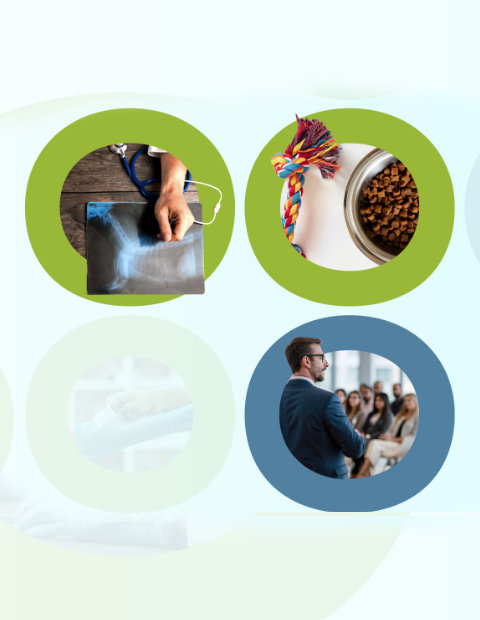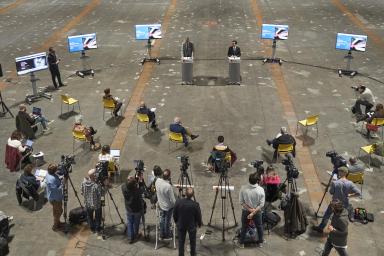

IFEMA is back in business - with an ambitious health protection strategy for its fairs

The kick-off will be on 22 March with the HIP-Hospitality Innovation Planet event, the first in-person fair in Spain after a one-year hiatus, followed by at least 50 more similar events.
The biggest challenge facing the reopening of IFEMA will be FITUR, the first experience of international movement in Europe, for which PCR and antigen tests will be required to gain access and thousands of exhibitors and professional visitors from all over the world will need accreditation.
As the second most important economic engine of Madrid, IFEMA is renowned for its capacity to boost employment and wealth. It is getting ready to start working at full capacity after a year of forced inactivity apart from some virtual events, and some hybrid meetings, such as the MBFWMadrid fashion show. That is according to José Vicente de los Mozos, president of the Executive Committee of IFEMA and Eduardo López-Puertas, the Managing Director of IFEMA, during a presentation today.
All this is great news for Madrid because of IFEMA’s driving effect on many sectors of the economy. The pinnacle will come in May with FITUR, which is even more significant this year as a champion of international mobility - this being the first European in-person fair of its size - and as a public service, symbolising the recovery of the tourism industry.
Exploring new opportunities through digitalisation
Although unable to operate as usual, IFEMA has used this time and its expertise to develop new ways of creating value for companies and for society. Furthering the digitalisation process has allowed it to explore new possibilities and harness new benefits.
Despite the pandemic, it has made great efforts to speed up the digitalisation of fairs and events, and to maintain its position as an economic catalyst capable of activating business opportunities and knowledge. Hence the work to design the features of a platform to bring together supply and demand in numerous sectors. One example was the fully digital FRUIT ATTRACTION LIVEConnect, a real success story that proved capable of mobilising contacts, closing deals and generating future expectations. A total of 16 virtual fairs in this format are ready to be rolled out during 2021, one of which - interSICOP LIVEConnect - is underway right now.
This digital development has been possible thanks to the transformation project which started in 2020, but which has really taken off during the last twelve months. More than a third of IFEMA's workforce has been working on this project, with interesting initiatives to develop proprietary digital platforms and new value-added services, as well as a business intelligence project, among others.
IFEMA is open for business again
According to IFEMA President José Vicente de los Mozos, the hope brought by vaccines and falling infection rates has prompted IFEMA “to make faster progress towards its goal to lift the ERTE affecting the workforce, scheduling a de-escalation and planning to hold all the events programmed for 2021, circumstances permitting”. The three-stage process will start in mid-March with the return of 40 people. By 5 April 90% of the IFEMA workforce will be back, joined by their remaining colleagues on 4 May”.
This commitment is an essential component of the institution’s intention to hold all the events scheduled for 2021, if possible. The idea is to make this a year of recovery for IFEMA, with a line-up of more than fifty in-person fairs, with additional virtual content capable of breaking with seasonality and attracting a wider audience. Thus, the concept of hybridization in fairs is consolidated, which gives greater power and scope to these fundamental business platforms.
The kick-off is scheduled for March, when it will host Spain’s first face-to-face fair in Spain in 2021: HIP, Hospitality Innovation Planet, the great innovation event for hospitality and restaurant professionals, between March 22 and 24 . A month when digital formats are still gaining momentum, with the announcement of seven exclusively digital fairs on the LIVEConnect platform in the bakery, pastry, education and technology for education sectors. Likewise, the entertainment programme is back on the scene in March, with the début of another great exhibition for families with the recreation of the world of SuperThings in Espacio 5.1.
In April there will be more fairs and in-person events such as ESTAMPA, the Contemporary Art Fair, and hybrids, like the MBFWMadrid fashion event, in addition to four digital fairs, linked to the trend and lifestyle sectors.
May and June will be a warm-up period, with five in-person fairs each month. Among them, will be Europe’s first resumption of mass international movement with FITUR with IFEMA’s health and safety strategy in full swing. Finally, to cap the first six months of the year, the great international contemporary art event ARCOmadrid will be held in July in time to celebrate its 40th anniversary.
Optimal safety precautions
To enable IFEMA to start holding its events again, it has spent the year analysing how to hold safe meetings where participants are fully protected. This has involved preparing an elaborate health strategy . As a result, IFEMA has developed an ambitious protocol with a host of essential measures to organise the flow of visitors and their mobility, establishing capacity control, social distancing, reducing the risk of direct contact by using digital registration, taking temperatures, broadening aisles and taking advantage of new technologies to count visitors, as well as ensuring effective air renewal in halls, among other innovations in this area.
One of the main features of this strategy is the unique ventilation system installed in IFEMA's halls, which renews all the air five times an hour, completely changing all the air in a hall in just over 20 minutes, while keeping everything at a comfortable temperature at all times. Coupled with large volumes and high ceilings, this technology means that the air that is breathed indoors is equivalent to being outdoors, thanks to air that is not recirculated, filtering systems and comfortable conditions.
All these protocols have been certified by AENOR and are strictly monitored to ensure that they comply with all anti-COVID safety monitoring group requirements created for the purpose in participation with different departments of IFEMA.
A safe environment for FITUR
According to Eduardo López-Puertas, managing director of IFEMA, “due to the international impact and the importance of a strategic sector like tourism, the institution’s biggest challenge is to hold FITUR in a manner that guarantees the highest level of safety for all attendees”. “FITUR was the last fair to be held in 2020 anywhere in the world and we are proud to be the first and only global fair to be held in 2021. This has been a massive undertaking and entails the obligation to provide antigen tests, and PCR all attendees as a prerequisite for accreditation and access to the fair as well as providing a medical area available at the fair for on-site testing”.
This safety strategy takes things a step further and intends to ensure that Madrid is also a safe space. To achieve this, IFEMA has joined forces with public administrations and the many sectors involved to make this a city-wide concept. The organisation is working with the Madrid Hotel Business Association, among others, to give FITUR participants who prefer to stay in a safe environment at all times a selection of hotels, means of transport and even restaurants and leisure venues that undertake to maintain certain standards, establishing circuits in Madrid for the thousands of visitors who will come to FITUR.
This is a huge challenge that will be a great test for validating a model that will revitalise the tourism industry and allow the recovery of business tourism.













